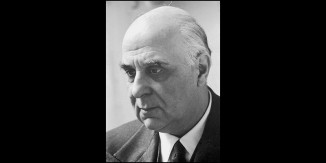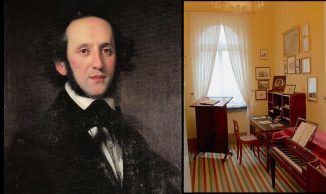37 years ago today, the Seikan Undersea Tunnel was opened in Japan, leading to a dramatic increase in freight traffic between the northern island of Hokkaido and the central island of Honshu. The Seikan holds a variety of records, including being the longest undersea tunnel by total length (33.46 miles), as well as having the second-longest segment under the seafloor, being the second-longest main-line tunnel of any kind, and the second-deepest undersea tunnel at 740 feet below sea level, and 250 feet below the sea bed. The tunnel was built mainly on expectations of traffic between the two islands, but the government couldn’t predict the rise in air travel making the Seikan virtually redundant for passengers even before it was finished. READ more… (1987)

As a feat of engineering, it’s nothing short of extraordinary, but as a government overseen infrastructure project, it turned out to be a giant guagmire that was delayed multiple times, requires expensive routine maintenance, and cost 9-times the original projections.
Nevertheless, 50 freight trains, including 21 round trips, use the Seikan tunnel to bring merchandise to and from the islands every day since it was opened. Also, the effect of being able to achieve stable and safe transportation that is not affected by the weather has been significant in safety, as the potential for a tunnel was first investigated after a ferry disaster that killed 1,400 people.
Modifications to the tunnel are underway to allow the Japanese Shinkansen to travel at greater speeds, which might shave 3 hours off the Tokyo to Sapporo route, which is currently an 8-hour long affair.
MORE Good News on this Date:
- Workdays for women and children in France were limited to 11 hours (1900)
- Mongolia declared its independence from China (1921)
- Mike Stoller, (with producing partner Jerry Leiber) who co-wrote over 70 hits that climbed American record charts, including “Hound Dog”, “Kansas City”, and “Jailhouse Rock”, was born (1933)
- The Allman Brothers Band recorded a rock concert in New York City (for the second night) that would become their classic album, Live At Fillmore East (1971)
- In response to widespread demonstrations by the deaf and hearing-impaired student body, Gallaudet University hired its first deaf president (1988)
- The journal Nature reported that 350,000-year-old upright-walking human footprints were found in Italy (2003)
Two years ago, worldwide unit sales of vinyl records climbed above CDs for the first time since 1987, completing the only low-tech resurgence of its kind. Vinyl sales topped $1.2 billion, compared to $399 million in CD sales, and even more stunningly, was the culmination of 17 consecutive years of growth.

Along with superior audio quality, the creative presentation of a vinyl record and its sleeve is a large draw for music lovers. Even still, the idea that for seventeen years, an antiquated technology consistently drew more users than a newer, more modern, and more widely adopted form is something that hasn’t really happened in other areas of commerce.
And while few people have dedicated CD players in their houses anymore, the Recording Industry Association of America detailed in a report last year that physical sales are even outperforming digital downloads which fell another 20% last year to just 3% of all purchased music.
“Music lovers clearly can’t get enough of the high-quality sound and tangible connection to artists vinyl delivers,” said RIAA Chairman and CEO Mitch Glazier. “and labels have squarely met that demand with a steady stream of exclusives, special reissues, and beautifully crafted packages and discs.” (2023)
125 years ago today, Giorgos Seferis, the Nobel Prize-winning Greek poet and career diplomat was born. Known as the most important poet of Greece in the 20th century, he would spend most of his young and professional life outside of Greece, not only because of his work as a diplomat but because of Greece’s continual occupation by Turks and then the Germans. This exile left a lasting imprint on his work, which won him the Nobel Prize in 1963.

Seferis was born in the Ottoman-controlled, culturally Greek city of Smyrna but after moving to Athens at age 14, he would not return to see it again until the 1950s.
During the Second World War, Seferis accompanied the Free Greek Government in exile to Crete, Egypt, South Africa, and Italy, and returned to liberated Athens in 1944. He continued to serve in the Ministry of Foreign Affairs and held diplomatic posts in Ankara, Turkey (1948–1950) and London (1951–1953). He was appointed minister to Lebanon, Syria, Jordan, and Iraq (1953–1956), and was Royal Greek Ambassador to the United Kingdom from 1957 to 1961. (1900)
This road has no end, has no relief, however hard you try
to recall your childhood years, those who left, those
lost in sleep, in the graves of the sea,
however much you ask bodies you’ve loved to stoop
under the harsh branches of the plane trees there
where a ray of the sun, naked, stood still
and a dog leapt and your heart shuddered,
the road has no relief; I’ve kept a rein on my life.
On this day, 84 years ago, the National Poet of annexed Palestine, Mahmoud Darwish, was born. Over his lifetime, Darwish published more than 30 volumes of poetry and eight books of prose. At one time or another, he was the editor of five different periodicals. Fleeing the Nakba during childhood, his poetry was necessarily somber, yet it penetrated the political lines drawn all over that ancient land by leaders old and new, and the translation of his works into Hebrew has made him popular across Israel. His poetry is part of the Israeli high school curriculum today.

According to an Israeli contemporary of Darwish, the poet’s Hebrew was excellent, and he described it as a “language of love.” He hoped for national reconciliation, a “second revolution of consciousness among the Israelis” and believed that on such an occasion, “the Jew will not be ashamed to find an Arab element in himself, and the Arab will not be ashamed to declare that he incorporates Jewish elements.”
Yet he was also strong in the belief that the status quo should not be maintained. It was said of his work that “Darwish, as a Palestinian poet of the Resistance committed himself to the… objective of nurturing the vision of defeat and disaster (after the June War of 1967), so much so that it would ‘gnaw at the hearts’ of the forthcoming generations.” READ The Cypress Broke and more below… (1941)
Below are two passages from his poem, The Cypress Broke.
244 years ago today, Sir William Herschel first observed Uranus from the garden of his house. With his homemade 6.2-inch reflecting telescope, he initially reported it as “either a Nebulous star or perhaps a comet,” and engaged in a “series of observations on the parallax of the fixed stars,” comparing it to a planet.

Herschel notified the Astronomer Royal Nevil Maskelyne of his discovery, who said, “I don’t know what to call it. It is as likely to be a regular planet moving in an orbit nearly circular to the sun as a Comet moving in a very eccentric ellipsis.” Astronomers soon began to suspect the truth.
In recognition of his achievement, King George III gave Herschel an annual stipend so he could move to Windsor and let the royal family could look through his telescopes. Herschel’s home in Bath, Somerset, England is now the Herschel Museum of Astronomy—and Uranus was named after the ancient Greek deity of the sky Uranus, the grandfather of Zeus. (1781)
And, on this day in 2013, Pope Francis was selected by the Vatican’s papal conclave to become the leader of the Catholic Church.
 Since then, numerous charitable and kind-hearted deeds have earned him rock-star levels of popularity, even among non-religious folks. Check out the Pope’s Top 10 Happiness Tips: Focus on Leisure, Family and Being Positive.
Since then, numerous charitable and kind-hearted deeds have earned him rock-star levels of popularity, even among non-religious folks. Check out the Pope’s Top 10 Happiness Tips: Focus on Leisure, Family and Being Positive.
And, on this day in 1993, Eric Clapton’s LP Unplugged hit No.1 on U.S. charts—and stayed there—becoming the most successful and best-selling LIVE album of all time. It was nominated for 9 Grammy Awards in 1993 and won 6, including Record of the Year, Album of the Year, and Song of the Year.
The MTV production shot in England followed the accidental death of his young son and was Clapton’s best-selling album, with sales of 26 million copies worldwide. It included wondrous versions of Layla and Tears of Heaven, and Love Comes Over You.
Also, 180 years ago today, Felix Mendelssohn’s renowned violin concerto premiered in Leipzig, Germany. It took six years to complete and became one of the most frequently performed and commonly recognizable violin pieces in history.
Lasting just under half an hour, the concerto was innovative and included many novel features for its time, distinctive aspects such as the almost-immediate entrance of the violin at the beginning of the work—rather than an orchestral lead-in. The Violin Concerto in E minor, Op. 64 was the German composer’s last orchestral work. One of the finest of the Romantic era, it was influential on so many other composers. LISTEN below to see if you recognize it within a few seconds… (1845) – Violin by Anne Sophie-Mutter
And, on this day in 1999, Cher hit No.1 with ‘Believe’, and the upbeat dance-pop song stayed atop the US singles chart for four weeks. Cher became the oldest woman to top the Hot 100, at age 53. The song reached No.1 in almost every country it charted, including the UK, Canada, Australia, Ireland, Spain, France, Germany and Italy. ‘Believe‘— an anthem of hope about overcoming a painful breakup—remains one of the best-selling singles of all time, logging 11 million sold worldwide.
WATCH the official video, and listen for the “auto-tuned” vocal effect, made by audio processing software, a relatively new process that became known as the “Cher effect”.
SHARE the Memories, Milestones, and Music…




















